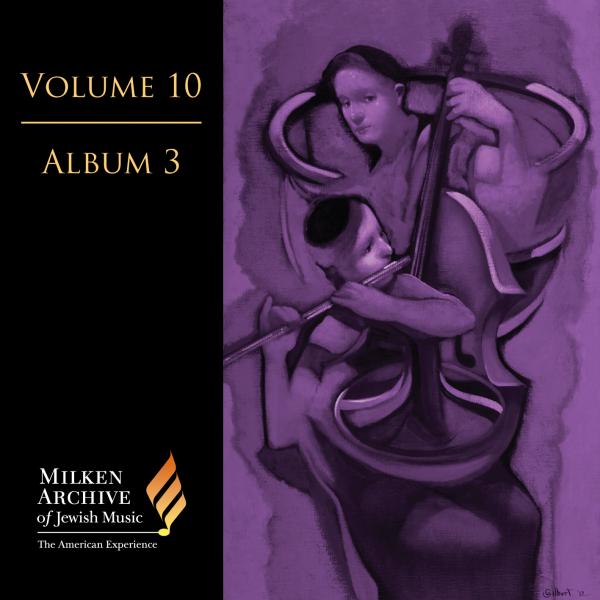Tracks
Track |
Time |
Play |
| From the Song of Songs | 03:35 | |
| And Samson Said | 02:33 | |
| Psalm 137 | 05:04 | |
| Isaac's Blessing | 02:57 |
Liner Notes
Davidovsky’s Biblical Songs, composed with the aid of a Meet the Composer–Reader’s Digest commission for a consortium headed by the Dallas-based ensemble Voices of Change, begins with still another, more intimate setting of a passage from the Song of Songs, this time dedicated to the composer’s wife, Elaine. Opening with a constantly mutating composite instrumental sonority initiated by a middle C struck quietly on the piano, a first high point is reached at the words “there I will give you my love,” accompanied by the two strings that at the peak of their crescendo suddenly add vibrato. This climax does not really subside, but is immediately replaced by the coolly sensuous, exotic roulades of alto flute and clarinet, reminiscent of the quasi-medieval figuration of portions of Scenes from Shir ha-Shirim, as the soprano sings of the fragrance of mandrakes and all manner of “pleasant fruits.” Anxious tremolandi and trills in strings and woodwinds reinforce the exhortation for the beloved to “make haste, swift as a gazelle,” before the return of the calm lyricism of the beginning.
The second song, “And Samson said…” bears a dedication to Davidovsky’s daughter Adriana and is by the far the most straightforward song from a rhythmic standpoint. That quality, along with playful reiterations of words and syllables (“with with the jaw bone bone”) and the optional repeat of the main body of the piece, recall a hallowed tradition of children’s songs based on rather grim, bloody events, in this case Samson’s dispatch of “a thousand men.” Oddly, even this relatively innocent piece cannot, for this listener at least, completely escape its composer’s tape studio heritage: The syllabic repetitions mentioned above recall, at least slightly, the use of electronic reverb.
Lyrics
Sung in English and Hebrew
Text: freely adapted by the composer from various Bible translations
SHIR HASHIRIM
Song of Songs 7:12–14; 2:17
Come, my beloved, let us go into the field let us lodge in the villages.
Let us get up early to the vineyards
Let us see if the vine has flowered whether the tender grape appear, if the pomegranates are in bloom.
There will I give my love to you.
The mandrakes yield a fragrance, and at our gates are all manner of pleasant fruits, new and old, which I have kept, my beloved, for you.
Make haste
Swift as a gazelle or a young hart to the hills of spices.
AND SAMSON SAID
Judges 15:16
With the jawbone of an ass heaps upon heaps.
With the jawbone of an ass have I slain a thousand men.
PSALM 137
By the rivers of Babylon
There we sat and wept when we remembered Zion.
On the willows we hanged our harps
For there thy that carried us away captive
Asked us for song,
Our tormentors, for amusement.
How shall we sing the Lord's song in a strange land,
im eshkachekh y’rushalayim
tishkach y’mini
tidbak l’shoni l’chiki
im lo ezk’rekhi
im lo a’aleh et y’rushalayim
al rosh simchati
Remember O Lord the Children of Edom, the day of Jerusalem's fall, how they cried.
Raze it, raze it to her very foundation
O daughter of Babylon who has to be destroyed
Happy shall he be that rewards you as you have served us,
Blessed shall he be that takes and dashes your children against the rocks
ISAAC'S BLESSING
Genesis 27:27–29
See ... Ah ... the smell of my son is like the smell of the fields which the Lord has blessed
Therefore, God give you of the dew of heaven and the fatness of the earth and plenty of corn and wine!
Let the people serve you and Nations bow down to you.
Be the Lord over your brothers and let your mother's sons bow down to you.
Cursed be they who curse you and blessed be they who bless you.
Ah ... the smell of my son is like the smell of the fields ...
Credits
Composer: Mario DavidovskyPerformers: Bonita Boyd, Flute; Steven Doane, Cello; Kenneth Grant, Clarinet; Oleh Krysa, Violin; Susan Narucki, Soprano; Barry Snyder, Piano
Publisher: C. F. Peters Corp.
